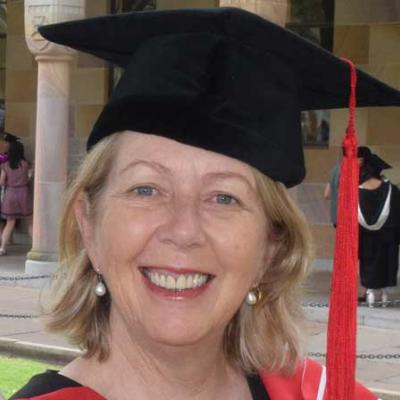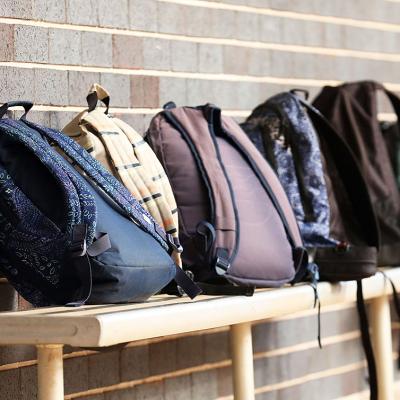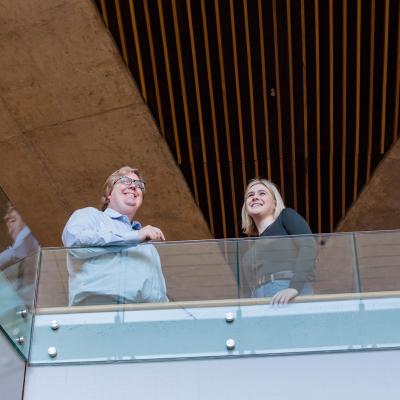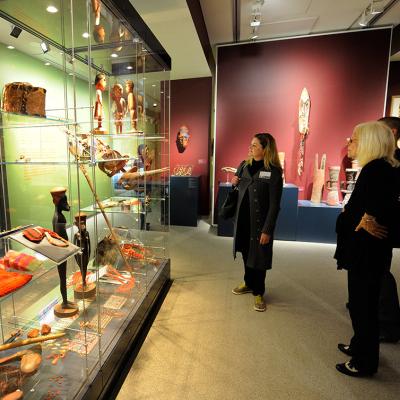“If you had the opportunity to write a letter to your 16-year-old self, what would you tell her?”
This is the question we posed to Professor Deborah Brown.
Her advice may surprise you.
Professor Deborah Brown is a professor of philosophy at UQ’s Faculty of Humanities, Arts and Social Sciences.
Dear Deb
First up, I’m not even sure the concept of a ‘former self’ makes sense. I do think what you choose makes all the difference in the world to me now. But are you identical with me? We don’t have a single cell in common anymore, and I’m not sure what else holds us together over time. We’re a bit like a river, you and me, and you can’t step in us twice, as Heraclitus said, and you wouldn’t want to, say I. Don’t obsess about what your past selves have done. Learn from them but remember, regret is the principal obstacle to happiness and you can’t change the past. (So, what exactly is the point of my trying to give you advice? Hmmm…)
From an early age, you are fascinated by humour. There is no greater buzz for you than making someone laugh. It costs you. Your grade 2 report card sums up it up in one sentence: “I don’t know how Deborah manages to finish all her work and disrupt the ENTIRE class.” By grade 5, you are a connoisseur of soap having had your mouth washed out so many times for irreverent, ‘colourful’ language. Sunlight is the worst, you say; it tastes like vomit. As an undergraduate, you join The Cane Toad Times, a satirical, counterculture magazine, driving comedic nails into the legitimacy coffin of a government run by a linguistically challenged peanut farmer and his cronies. (This is a transformative experience – do not skip this part!)
What is philosophy but humour in the service of truth and justice? Or all the jokes no one understands? You will use gentle ridicule to help men who say things to you like “it’s too bad women are not biologically capable of doing philosophy” see that they are being, well, ridiculous. It won’t always work, and you won’t always be ‘gentle’. C’est la vie. C’est la guerre. Having difficult conversations is something you will struggle with, but someone has to do it!
I’m not sure I am the best to give you ‘career advice’ because like that river that ‘don’t know where it’s flowing’, to quote The Boss, I have never really pursued a career for the sake of a career. Mind you, the term ‘career’ is only a 17th century invention and anything that new has to be taken with a grain of salt. So here is my non-career-but-still-hopefully-useful advice.
Seek to add value and the rest will come
Obsessing about the perfect career is like obsessing about the perfect holiday. There’s always going to be an unpredictable hailstorm, sand in your sandwich, a cancellation that leaves you in a Motel 6 on the interstate instead of the Bel Air. Boredom, and donkeys, apparently, kill more people than anything else – ok, I just made that statistic up, but c’mon, what you want in life is the opportunity to do interesting, creative, and fulfilling work. Make it less about you and more about creating or adding value to others and to the world. This will enable you to live a creative life and bring you greater rewards than you can imagine, because opportunities come to those who create opportunities for others. Study Humanities – they teach you what value is and where it is needed.
Learn the value of a good argument
As an undergraduate, only one (untenured) woman teaches you philosophy. As a graduate student, only 3 of the 68 philosophers at your graduate school are tenured or tenure-track women. When you start as an academic at UQ in 1997, only 4 per cent of the entire professoriate are women. You will begin to wonder whether you need to grow a beard to get promoted. But by 2019 you are the first female professor of Philosophy in the 108 years philosophy has existed at UQ. (Ok, by then, admittedly, there are a few beard hairs.) You’ll write books and articles, research grants, travel to exotic locations that mix philosophy with hot pools, and with an outstanding team, you’ll helping put critical thinking back into schools, where it hasn’t been since Socrates first scratched a triangle in the dirt and helped a slave boy discover the wonders of geometry simply by asking a few questions.
You’re a working-class kid. How will you get where you are going? Because training in philosophy is empowering. You can smell a fallacy at 50 paces and can mount a cogent argument. Arguments are everywhere and many of them are bad. Philosophy teaches you how to identify, construct, and demolish (where necessary) arguments. Every area of study, every workplace needs argumentation skills. Every job application is an argument with the conclusion ‘Hire me!’ Learn how to argue and the world is your oyster.
Don’t listen (to)
- Politicians
- Career counsellors
- Parents
- Friends
- Teachers
- The little voice inside your head
- Your ‘gut feeling’, or
- All of the above.
Correct! In fact, don’t listen to anyone, including probably yourself. At least don’t do anything just on the testimony of others (or your stomach – that is probably just indigestion, BTW). Certainly, don’t continue with a course of study because some teacher will be disappointed if you don’t follow in their footsteps or sit at their feet like some adoring, transfixed Chihuahua. Make informed decisions and make them yours. Take advice, reason with others, but make the decisions yourself. Take pride in your autonomy and consolation from the fact that even when you don’t get the outcome you hoped for, you used your reason to the best of your ability. This is the Consolation of Philosophy.
Certainly, do not listen to people who say studying philosophy will be a waste of time or won’t get you a job. No matter what you choose to specialise in, you will be more employable and happier if you undertake some study in philosophy. Critical thinking, effective communication, and interpersonal skills, are skills that 93 per cent of employers recently surveyed by the American Association of Colleges and Universities say are more important than what you major in. In STEM (science, tech, engineering and maths) fields, the highest growth in demand, according to a recent CSIRO report, is in scientific thinking, critical thinking and systems analysis – all thinking skills. By studying philosophy, you’ll acquire these skills in spades and be able to feign erudition at cocktail parties like you wouldn’t believe!
Finally, avoid mid-life crises until, well, mid-life
Ok, so you’re not going to like this advice, but until you’re nearly 30, you’re not going to recognise a meaningful relationship if it bit you on the amygdala. If you were asked to list all the qualities you currently find desirable, you would find they are qualities of any number of randomly chosen people and a good number of the higher animals. No one is very discriminating at 16! Never let a failing relationship derail you, however, especially not from the life of the mind that is yours to make. Your best relationships evolve from solid friendships so work on those first. And remember, if a crush-object doesn’t bring you joy and delight now, they’re unlikely to do so when they’re middle-aged and grumpy. (Just telling it like it is, Dollface!)
See you in 40 (or so) years! Enjoy the ride!
Deb
Can you see your future in arts?
If you're thinking about creating your own career in philosophy, history, social science or any other field of the arts, our programs can help you get there.
Discover your dream university program
About Deborah
Professor Deborah Brown is a professor of philosophy at UQ’s Faculty of Humanities, Arts and Social Sciences. She is Director of The University of Queensland Critical Thinking Project and a fellow of the Australian Academy of Humanities.
She was the first female professor of philosophy in Queensland, an incredible achievement when only 26 per cent of senior academic staff at level D and above at the time were women.
Professor Brown’s research interests span Early Modern Philosophy, Philosophy of Mind, Metaphysics, and Philosophy and Education.
UQ’s Critical Thinking Project is an extensive outreach program, offering training in philosophical teaching methods for all educational contexts and in philosophy and critical thinking for leadership and innovation. Deb and her team also support students from disadvantaged backgrounds acquire the academic capabilities needed to prepare them for university, improving both their access to and success at university.
Deb graduated from UQ with a Bachelor of Arts (Honours) and was a university medallist. She went on to study her Master of Arts and PhD at the University of Toronto.






